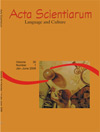<b>Buried hurts and colliding dreams in Yvonne Vera’s <em>Butterfly Burning</em></b> - DOI: 10.4025/actascilangcult.v31i1.3572
Abstract
Zimbabwean author Yvonne Vera’s Butterfly Burning (1998) depicts an intense and tragically concluded love relationship between a middle-aged colonised male labourer, Fumbatha, and an idealistic and much younger woman, Phephelaphi. The context is the ghetto adjoining the city of Bulawayo in late colonial Southern Rhodesia. The article employs the concepts of genealogies and of transmodernity to delineate Vera’s reinscription of colonised African men and women in her illocutionary, densely poetic account of the growth of modernity in Africa, tragic because (despite similar, buried hurts) the protagonists’ dreams are at odds.Downloads
Metrics
DECLARATION OF ORIGINALITY AND COPYRIGHTS
I Declare that current article is original and has not been submitted for publication, in part or in whole, to any other national or international journal.
The copyrights belong exclusively to the authors. Published content is licensed under Creative Commons Attribution 4.0 (CC BY 4.0) guidelines, which allows sharing (copy and distribution of the material in any medium or format) and adaptation (remix, transform, and build upon the material) for any purpose, even commercially, under the terms of attribution.
Read this link for further information on how to use CC BY 4.0 properly.




















6.png)









